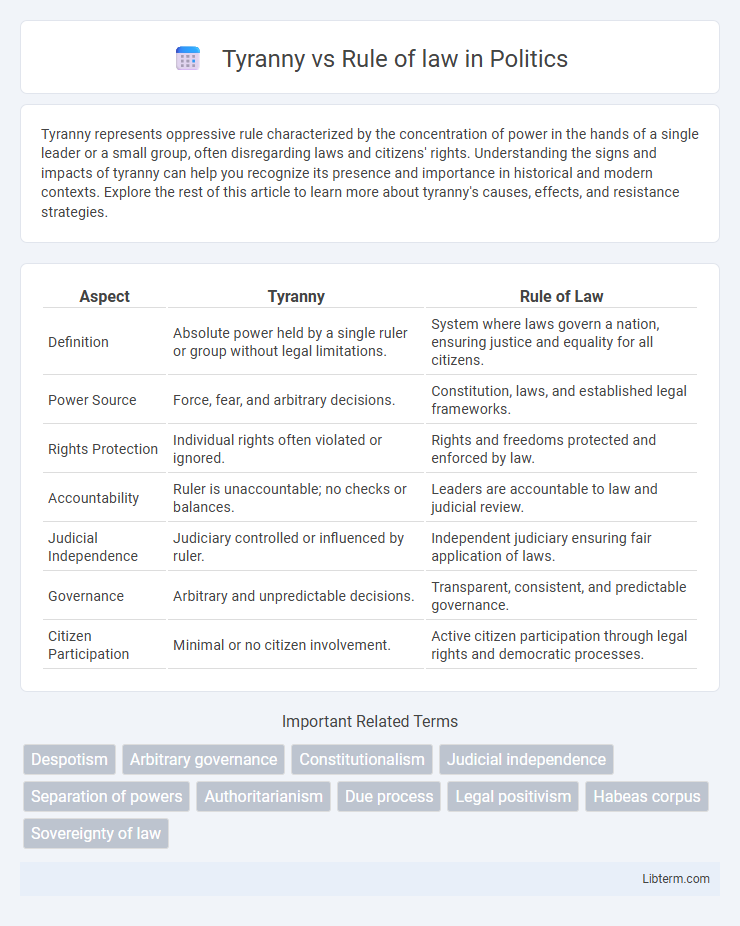Tyranny represents oppressive rule characterized by the concentration of power in the hands of a single leader or a small group, often disregarding laws and citizens' rights. Understanding the signs and impacts of tyranny can help you recognize its presence and importance in historical and modern contexts. Explore the rest of this article to learn more about tyranny's causes, effects, and resistance strategies.
Table of Comparison
| Aspect | Tyranny | Rule of Law |
|---|---|---|
| Definition | Absolute power held by a single ruler or group without legal limitations. | System where laws govern a nation, ensuring justice and equality for all citizens. |
| Power Source | Force, fear, and arbitrary decisions. | Constitution, laws, and established legal frameworks. |
| Rights Protection | Individual rights often violated or ignored. | Rights and freedoms protected and enforced by law. |
| Accountability | Ruler is unaccountable; no checks or balances. | Leaders are accountable to law and judicial review. |
| Judicial Independence | Judiciary controlled or influenced by ruler. | Independent judiciary ensuring fair application of laws. |
| Governance | Arbitrary and unpredictable decisions. | Transparent, consistent, and predictable governance. |
| Citizen Participation | Minimal or no citizen involvement. | Active citizen participation through legal rights and democratic processes. |
Understanding Tyranny: Definition and Characteristics
Tyranny is a form of government in which absolute power is concentrated in the hands of a single ruler or a small group, often maintained through oppressive and arbitrary measures. Key characteristics include the absence of legal constraints, suppression of political dissent, and violation of individual rights, contrasting sharply with the rule of law where laws govern impartially and protect citizens. Understanding tyranny involves recognizing its reliance on fear and coercion, undermining democratic principles and the accountability mechanisms essential for just governance.
Rule of Law Explained: Core Principles
Rule of law ensures all individuals and institutions are accountable to laws that are publicly promulgated, equally enforced, and independently adjudicated. Core principles include legal certainty, transparency, protection of fundamental rights, and access to justice without discrimination. This framework prevents arbitrary governance, promoting fairness and stability within a society.
Historical Examples of Tyranny
Historical examples of tyranny include the reign of Julius Caesar in ancient Rome, characterized by the consolidation of power and the erosion of the Roman Republic's checks and balances. In modern history, Adolf Hitler's dictatorship in Nazi Germany exemplified tyranny through totalitarian control, suppression of dissent, and systemic human rights abuses. These instances contrast sharply with the rule of law, where legal frameworks govern authority impartially to protect citizens' rights and limit arbitrary power.
The Origins and Evolution of Rule of Law
The origins and evolution of the rule of law trace back to ancient civilizations such as Mesopotamia, where codified laws like the Code of Hammurabi established legal principles over arbitrary rulership. The Magna Carta of 1215 marked a critical development by limiting monarchical power and embedding legal accountability. Modern conceptions of rule of law emphasize equality before the law, separation of powers, and protection of fundamental rights, evolving as safeguards against tyranny and unchecked authority.
Key Differences: Tyranny vs Rule of Law
Tyranny is characterized by the concentration of power in the hands of a single ruler or group, often leading to arbitrary decisions and suppression of individual freedoms. In contrast, the rule of law ensures that laws govern a nation, applying equally to all individuals and protecting fundamental rights through established legal frameworks. Key differences include accountability, where tyranny lacks checks and balances, while the rule of law mandates transparency, justice, and adherence to codified statutes.
Impacts of Tyranny on Society and Governance
Tyranny undermines societal stability by concentrating power in the hands of a single ruler or a small group, eroding checks and balances essential for accountable governance. It suppresses individual freedoms, stifles political dissent, and fosters widespread fear and corruption, leading to social unrest and economic decline. The absence of the rule of law under tyranny diminishes institutional trust, weakens civil liberties, and impairs long-term development and democratic governance.
The Importance of Rule of Law for Justice and Freedom
The rule of law ensures that all individuals and institutions are accountable to laws that are fairly applied and enforced, safeguarding justice and preventing arbitrary power typical of tyranny. By providing clear legal frameworks and protecting fundamental rights, the rule of law fosters freedom, equality, and social stability. Without adherence to the rule of law, societies risk oppression, unchecked authority, and the erosion of civil liberties.
Safeguards Against Tyranny in Modern Democracies
Safeguards against tyranny in modern democracies include constitutional checks and balances, independent judiciary systems, and transparent electoral processes that ensure accountability and prevent abuse of power. Separation of powers distributes authority among executive, legislative, and judicial branches to maintain a system of mutual oversight. Additionally, civil liberties and free press act as crucial mechanisms for protecting individual rights and promoting government transparency.
Rule of Law: Foundation for Human Rights
Rule of law establishes a framework where laws are transparent, equally enforced, and protect fundamental human rights, ensuring accountability and limiting arbitrary power. It safeguards civil liberties, promotes justice, and supports democratic governance by preventing tyranny and abuse. Countries adhering to the rule of law demonstrate stronger protections for freedom of speech, fair trials, and equality before the law.
Building Resilient Institutions Against Tyranny
Building resilient institutions against tyranny involves strengthening the rule of law through transparent governance, robust legal frameworks, and accountability mechanisms that prevent the concentration of power. Independent judiciary systems and free media serve as critical defenses by ensuring checks and balances and exposing abuses of authority. Empowering civil society and fostering citizen participation further safeguard democratic principles and institutional integrity against authoritarian threats.
Tyranny Infographic

 libterm.com
libterm.com